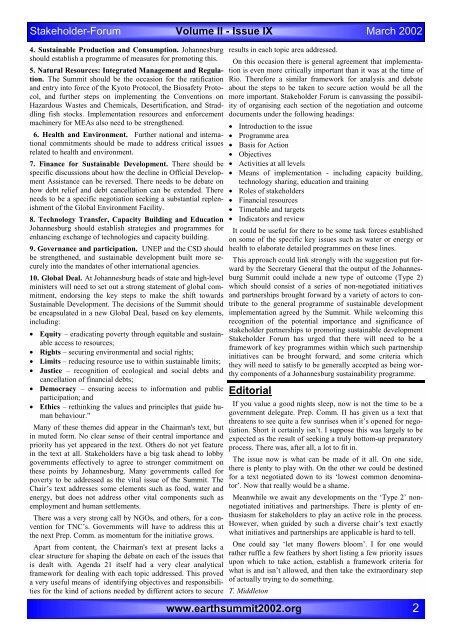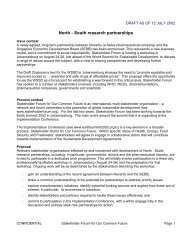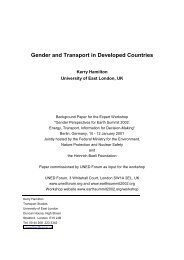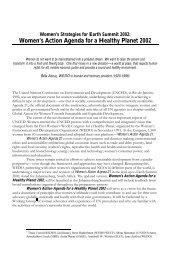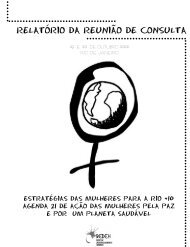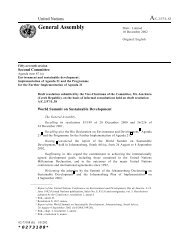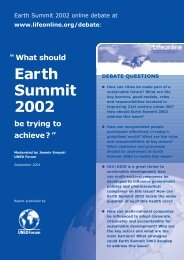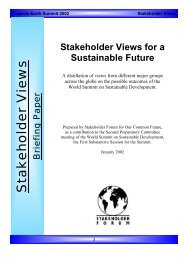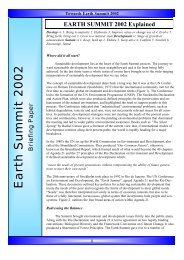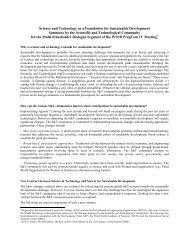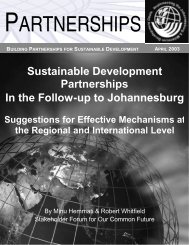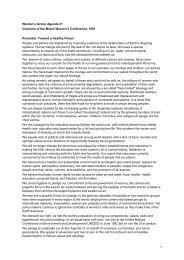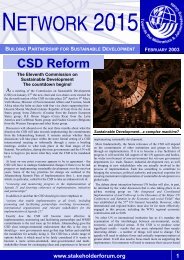Issue 19.pdf - Earth Summit 2002
Issue 19.pdf - Earth Summit 2002
Issue 19.pdf - Earth Summit 2002
Create successful ePaper yourself
Turn your PDF publications into a flip-book with our unique Google optimized e-Paper software.
Stakeholder-Forum Volume II - <strong>Issue</strong> IX March <strong>2002</strong><br />
4. Sustainable Production and Consumption. Johannesburg<br />
should establish a programme of measures for promoting this.<br />
5. Natural Resources: Integrated Management and Regulation.<br />
The <strong>Summit</strong> should be the occasion for the ratification<br />
and entry into force of the Kyoto Protocol, the Biosafety Protocol,<br />
and further steps on implementing the Conventions on<br />
Hazardous Wastes and Chemicals, Desertification, and Straddling<br />
fish stocks. Implementation resources and enforcement<br />
machinery for MEAs also need to be strengthened.<br />
6. Health and Environment. Further national and international<br />
commitments should be made to address critical issues<br />
related to health and environment.<br />
7. Finance for Sustainable Development. There should be<br />
specific discussions about how the decline in Official Development<br />
Assistance can be reversed. There needs to be debate on<br />
how debt relief and debt cancellation can be extended. There<br />
needs to be a specific negotiation seeking a substantial replenishment<br />
of the Global Environment Facility.<br />
8. Technology Transfer, Capacity Building and Education<br />
Johannesburg should establish strategies and programmes for<br />
enhancing exchange of technologies and capacity building.<br />
9. Governance and participation. UNEP and the CSD should<br />
be strengthened, and sustainable development built more securely<br />
into the mandates of other international agencies.<br />
10. Global Deal. At Johannesburg heads of state and high-level<br />
ministers will need to set out a strong statement of global commitment,<br />
endorsing the key steps to make the shift towards<br />
Sustainable Development. The decisions of the <strong>Summit</strong> should<br />
be encapsulated in a new Global Deal, based on key elements,<br />
including:<br />
• Equity – eradicating poverty through equitable and sustainable<br />
access to resources;<br />
• Rights – securing environmental and social rights;<br />
• Limits – reducing resource use to within sustainable limits;<br />
• Justice – recognition of ecological and social debts and<br />
cancellation of financial debts;<br />
• Democracy – ensuring access to information and public<br />
participation; and<br />
• Ethics – rethinking the values and principles that guide human<br />
behaviour."<br />
Many of these themes did appear in the Chairman's text, but<br />
in muted form. No clear sense of their central importance and<br />
priority has yet appeared in the text. Others do not yet feature<br />
in the text at all. Stakeholders have a big task ahead to lobby<br />
governments effectively to agree to stronger commitment on<br />
these points by Johannesburg. Many governments called for<br />
poverty to be addressed as the vital issue of the <strong>Summit</strong>. The<br />
Chair’s text addresses some elements such as food, water and<br />
energy, but does not address other vital components such as<br />
employment and human settlements.<br />
There was a very strong call by NGOs, and others, for a convention<br />
for TNC’s. Governments will have to address this at<br />
the next Prep. Comm. as momentum for the initiative grows.<br />
Apart from content, the Chairman's text at present lacks a<br />
clear structure for shaping the debate on each of the issues that<br />
is dealt with. Agenda 21 itself had a very clear analytical<br />
framework for dealing with each topic addressed. This proved<br />
a very useful means of identifying objectives and responsibilities<br />
for the kind of actions needed by different actors to secure<br />
results in each topic area addressed.<br />
On this occasion there is general agreement that implementation<br />
is even more critically important than it was at the time of<br />
Rio. Therefore a similar framework for analysis and debate<br />
about the steps to be taken to secure action would be all the<br />
more important. Stakeholder Forum is canvassing the possibility<br />
of organising each section of the negotiation and outcome<br />
documents under the following headings:<br />
• Introduction to the issue<br />
• Programme area<br />
• Basis for Action<br />
• Objectives<br />
• Activities at all levels<br />
• Means of implementation - including capacity building,<br />
technology sharing, education and training<br />
• Roles of stakeholders<br />
• Financial resources<br />
• Timetable and targets<br />
• Indicators and review<br />
It could be useful for there to be some task forces established<br />
on some of the specific key issues such as water or energy or<br />
health to elaborate detailed programmes on these lines.<br />
This approach could link strongly with the suggestion put forward<br />
by the Secretary General that the output of the Johannesburg<br />
<strong>Summit</strong> could include a new type of outcome (Type 2)<br />
which should consist of a series of non-negotiated initiatives<br />
and partnerships brought forward by a variety of actors to contribute<br />
to the general programme of sustainable development<br />
implementation agreed by the <strong>Summit</strong>. While welcoming this<br />
recognition of the potential importance and significance of<br />
stakeholder partnerships to promoting sustainable development<br />
Stakeholder Forum has urged that there will need to be a<br />
framework of key programmes within which such partnership<br />
initiatives can be brought forward, and some criteria which<br />
they will need to satisfy to be generally accepted as being worthy<br />
components of a Johannesburg sustainability programme.<br />
Editorial<br />
If you value a good nights sleep, now is not the time to be a<br />
government delegate. Prep. Comm. II has given us a text that<br />
threatens to see quite a few sunrises when it’s opened for negotiation.<br />
Short it certainly isn’t. I suppose this was largely to be<br />
expected as the result of seeking a truly bottom-up preparatory<br />
process. There was, after all, a lot to fit in.<br />
The issue now is what can be made of it all. On one side,<br />
there is plenty to play with. On the other we could be destined<br />
for a text negotiated down to its ‘lowest common denominator’.<br />
Now that really would be a shame.<br />
Meanwhile we await any developments on the ‘Type 2’ nonnegotiated<br />
initiatives and partnerships. There is plenty of enthusiasm<br />
for stakeholders to play an active role in the process.<br />
However, when guided by such a diverse chair’s text exactly<br />
what initiatives and partnerships are applicable is hard to tell.<br />
One could say ‘let many flowers bloom’. I for one would<br />
rather ruffle a few feathers by short listing a few priority issues<br />
upon which to take action, establish a framework criteria for<br />
what is and isn’t allowed, and then take the extraordinary step<br />
of actually trying to do something.<br />
T. Middleton<br />
www.earthsummit<strong>2002</strong>.org 2


